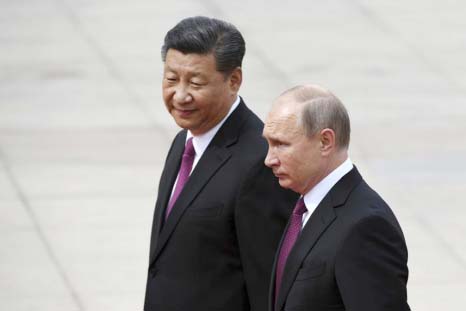
AP, Beijing :
Cooperation between Russia and China is at an all-time high, Russian President Vladimir Putin told his Chinese counterpart, Xi Jinping, in a meeting Friday ahead of a summit featuring their two countries and six Asian states.
“Cooperation with China is one of Russia’s top priorities and it has reached an unprecedented level,” Putin said.
Xi said the two countries have “always firmly taken the development of relations as a priority direction.”
They have “resolutely supported the other’s core interests … and jointly proactively participated in international affairs and global governance,” Xi said.
Russia and China have responded to the U.S. national security strategy describing them as America’s top adversaries by vowing to further expand their economic, political and military cooperation.
They have also sought to strengthen the Shanghai Cooperation Organization, a regional grouping they created, which meets this weekend.
Further underlining the relationship’s importance, the visit comes just a month since Putin began his new term in office. He and Xi have met 25 times – five times last year alone, according to Putin’s foreign affairs adviser, Yuri Ushakov.
Following a formal welcoming ceremony at the Great Hall of the People in central Beijing, Putin first with Premier Li Keqiang, telling him that Russia-China trade and economic ties have “gained a good tempo, and we are looking for new spheres of cooperation.”
Li said bilateral trade is expected to reach $100 billion this year and voiced a readiness to expand cooperation in both traditional and new spheres, including nuclear energy.
Bilateral trade shrank from nearly $100 billion in 2014 to some $60 billion the following year due to a sharp depreciation of the Russian currency. It has since partly recovered as the ruble has strengthened, reaching nearly $90 billion last year.
Russia has also increasingly turned to China as a market for its energy exports and a source of investment in infrastructure projects.
Cooperation between Russia and China is at an all-time high, Russian President Vladimir Putin told his Chinese counterpart, Xi Jinping, in a meeting Friday ahead of a summit featuring their two countries and six Asian states.
“Cooperation with China is one of Russia’s top priorities and it has reached an unprecedented level,” Putin said.
Xi said the two countries have “always firmly taken the development of relations as a priority direction.”
They have “resolutely supported the other’s core interests … and jointly proactively participated in international affairs and global governance,” Xi said.
Russia and China have responded to the U.S. national security strategy describing them as America’s top adversaries by vowing to further expand their economic, political and military cooperation.
They have also sought to strengthen the Shanghai Cooperation Organization, a regional grouping they created, which meets this weekend.
Further underlining the relationship’s importance, the visit comes just a month since Putin began his new term in office. He and Xi have met 25 times – five times last year alone, according to Putin’s foreign affairs adviser, Yuri Ushakov.
Following a formal welcoming ceremony at the Great Hall of the People in central Beijing, Putin first with Premier Li Keqiang, telling him that Russia-China trade and economic ties have “gained a good tempo, and we are looking for new spheres of cooperation.”
Li said bilateral trade is expected to reach $100 billion this year and voiced a readiness to expand cooperation in both traditional and new spheres, including nuclear energy.
Bilateral trade shrank from nearly $100 billion in 2014 to some $60 billion the following year due to a sharp depreciation of the Russian currency. It has since partly recovered as the ruble has strengthened, reaching nearly $90 billion last year.
Russia has also increasingly turned to China as a market for its energy exports and a source of investment in infrastructure projects.

